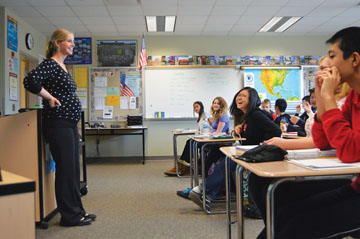The second Monday of October, commonly known as Columbus Day, had a more solemn tone this year in Seattle. The city is now among the growing number of cities in the United States, including Minneapolis and Berkeley, CA, which now celebrate Indigenous Peoples’ Day instead of Columbus Day. The Seattle City Council unanimously voted on Oct. 6 to rename the holiday, acknowledging that natives had lived in the Americas before Christopher Columbus’s arrival.
This change exemplifies the shift these days toward recounting history more accurately and interpreting bias more critically. In addition, people are realizing the inherent bias when victors or those in power tell stories of war and discovery. Kaya Mernitz, AP European History student and sophomore, said she agrees with the renaming of Columbus Day because it conveys a truer perspective of history.
“(Indigenous Peoples’ Day) is probably a little more accurate, because it wasn’t actually Columbus who was the first one to stumble upon the Americas,” Mernitz said. “He was just the first one to claim it as his own. That’s one of the misgivings of history being told by the victors. At the time, it was Europe who wanted everyone to know how mighty they were, and so they wanted to take credit.”
 According to Mernitz, changing the holiday’s name may also make people forget the significance of that day in history.
According to Mernitz, changing the holiday’s name may also make people forget the significance of that day in history.
Katie Kelly, AP World History teacher, said she thinks the kind of bias in the previous example and in most historical examples is largely inevitable.
“I think almost every time (in history) is told from the perspective of the victors, especially initially,” Kelly said. “As soon as the event is done, the people who won want to justify their victory, either the negative things they did to win or just to celebrate the fact that they did win. Sometimes, later on, people are good at going back and reassessing the history they told, but initially, it is almost always told by the victors.”
Mernitz said she thinks this reassessment is all part of a trend trying to create balance among all the facets in history.
“It’s almost like a second Enlightenment,” Mernitz said. “People are trying to learn more and they want to know even more about the past than we ever have before, so people are looking to see the whole truth, and not just the one perspective.”
According to Dana Wang, U.S. History student and junior, this trend is apparent in her history class.
“My history teacher always makes sure to tell us both sides of the story, which helps us research better information,” Wang said.
A group of protestors from a school in Colorado has also recently criticized the College Board’s new AP U.S. History curriculum for focusing too much on the events that glorify the United States and de-emphasizing the unflattering ones. However, according to Kelly, the College Board effectively incorporates a variety of events in history classes, especially world history.
“(History) is inherently sided toward what we know, and so I think the AP program is trying to bring in history that people don’t already know. With world history in particular, they really focus on bringing in the history of Latin America, history of Africa and history of Asia to try to balance out the Western focus,” Kelly said. “I think the AP program is doing a good job of trying to balance out what, in some instances, has been an imbalance. It’s been the story of rich white men, and now (the AP program) is saying, ‘Well, rich white men did a lot of things, but that’s not the whole story of America.’”
Mernitz said while bias is unavoidable, it is much more limited in her class. However, history books are always going to have some bias because Americans, who have won most wars they participated in, write them.
Wang also said, in the defense of the protestors from Colorado, learning from failures is an especially integral part of history.
“If you don’t emphasize failures, then they’re bound to be made again in the future. Even if you emphasize them, they’ll still probably be made again in the future, but we’ll be more aware of (them),” Wang said.
Kelly said while it would be great to increase objectivity in history, it is a very difficult goal, despite the progress in these past years.
“Balance in history is one of the hardest things to create, because every time you bring up a new person, a new viewpoint, a lot of times that changes how you have to look at other viewpoints,” she said. “So, maintaining that balance is a constant struggle.”

































![AI in films like "The Brutalist" is convenient, but shouldn’t take priority [opinion]](https://hilite.org/wp-content/uploads/2025/02/catherine-cover-1200x471.jpg)









































![Review: “The Immortal Soul Salvage Yard:” A criminally underrated poetry collection [MUSE]](https://hilite.org/wp-content/uploads/2025/03/71cju6TvqmL._AC_UF10001000_QL80_.jpg)
![Review: "Dog Man" is Unapologetically Chaotic [MUSE]](https://hilite.org/wp-content/uploads/2025/03/dogman-1200x700.jpg)
![Review: "Ne Zha 2": The WeChat family reunion I didn’t know I needed [MUSE]](https://hilite.org/wp-content/uploads/2025/03/unnamed-4.png)
![Review in Print: Maripaz Villar brings a delightfully unique style to the world of WEBTOON [MUSE]](https://hilite.org/wp-content/uploads/2023/12/maripazcover-1200x960.jpg)
![Review: “The Sword of Kaigen” is a masterpiece [MUSE]](https://hilite.org/wp-content/uploads/2023/11/Screenshot-2023-11-26-201051.png)
![Review: Gateron Oil Kings, great linear switches, okay price [MUSE]](https://hilite.org/wp-content/uploads/2023/11/Screenshot-2023-11-26-200553.png)
![Review: “A Haunting in Venice” is a significant improvement from other Agatha Christie adaptations [MUSE]](https://hilite.org/wp-content/uploads/2023/11/e7ee2938a6d422669771bce6d8088521.jpg)
![Review: A Thanksgiving story from elementary school, still just as interesting [MUSE]](https://hilite.org/wp-content/uploads/2023/11/Screenshot-2023-11-26-195514-987x1200.png)
![Review: "When I Fly Towards You", cute, uplifting youth drama [MUSE]](https://hilite.org/wp-content/uploads/2023/09/When-I-Fly-Towards-You-Chinese-drama.png)
![Postcards from Muse: Hawaii Travel Diary [MUSE]](https://hilite.org/wp-content/uploads/2023/09/My-project-1-1200x1200.jpg)
![Review: "Ladybug & Cat Noir: The Movie," departure from original show [MUSE]](https://hilite.org/wp-content/uploads/2023/09/Ladybug__Cat_Noir_-_The_Movie_poster.jpg)
![Review in Print: "Hidden Love" is the cute, uplifting drama everyone needs [MUSE]](https://hilite.org/wp-content/uploads/2023/09/hiddenlovecover-e1693597208225-1030x1200.png)
![Review in Print: "Heartstopper" is the heartwarming queer romance we all need [MUSE]](https://hilite.org/wp-content/uploads/2023/08/museheartstoppercover-1200x654.png)





